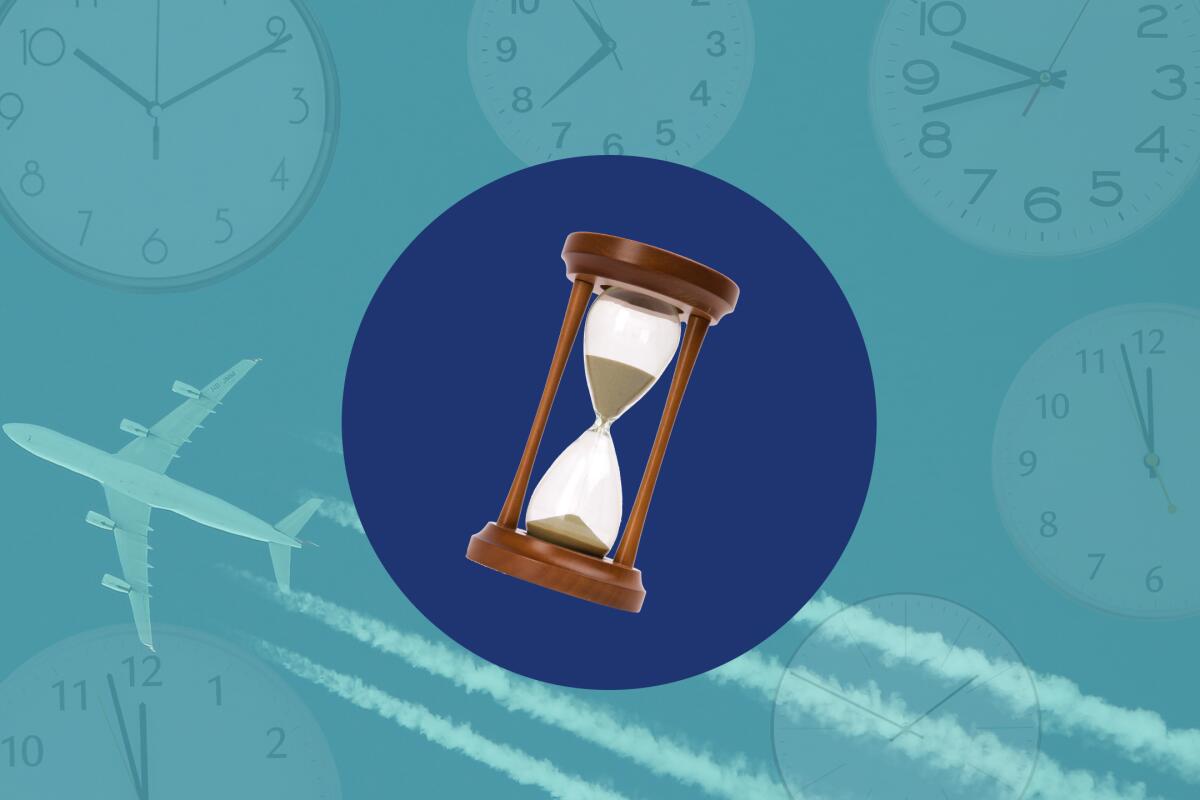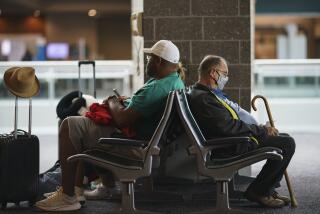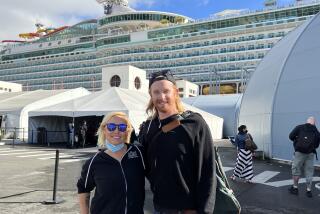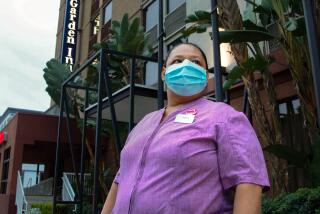COVID-19 restrictions can be a guessing game for airline crews

- Share via
I’m a flight attendant for a legacy U.S. airline and am writing from a hotel room in Panama City, Panama. Today is Jan. 11. The situation here is not good. As of yesterday, the Panamanian Ministry of Health has recorded 279,196 total cases of COVID-19.
The Centers for Disease Control and Prevention categorizes destinations according to risk:
• Level 1: Low level of COVID-19
• Level 2: Moderate level of COVID-19
• Level 3: High level of COVID-19
• Level 4: Very high level of COVID-19
Panama is currently at level 4. On its website, the CDC’s warning is clear: “Travelers should avoid all travel to Panama.”
Yet here I am, along with two pilots and three flight attendants who worked a flight from Miami the previous night. The Airbus 321S we flew in on is configured with 179 seats; 108 were unoccupied.
After I arrived at Tocumen International Airport, a weary immigration official stamped my passport. With a languid hand gesture, he directed me to the exit. But when I looked over my shoulder, I realized my crew was not behind me in the queue. They were being detained in a far corner of the immigration area by medical personnel wearing white lab coats.
When I realized my colleagues were being processed at a COVID-19 checkpoint, which I had somehow been allowed to bypass, I did something I’ve never done in 35 years as an international flight attendant. I turned around and walked back through the immigration checkpoint, exiting the country I had legally entered.
My temperature was taken by medical personnel. I signed a document stating I had no COVID-19 symptoms. I provided my hotel and cellphone numbers for contact tracing. Then, for the second time in 20 minutes, I approached the immigration checkpoint.
Hiking and biking on backwoods trails offer travelers a couple of ways to explore — and still keep their distance from others.
The official nodded and waved me through.
At the Sheraton Grand Panama, the entrance, lobby and adjoining areas were deserted. A lone front-desk clerk pushed our room keys through a slot in a tall plexiglass barrier. Due to a government-imposed lockdown, she said, “All restaurants in the city closed at 9 p.m.” This includes hotel restaurants. Because we arrived after 9 p.m. there was no food available. Anywhere. And no room service until 7 a.m. the next day. It’s my fault for not remembering to bring food from home.
So this morning, after a long-awaited breakfast, I called the front desk to ask whether guests were allowed to venture outside the hotel. Because of COVID-19 restrictions, I was told, “Only women are allowed to go outside today. Men can go out tomorrow and the women must stay home.”
Baffled, I ended the call and logged on to the U.S. Embassy in Panama website. Sure enough, in an effort to fight the spread of the coronavirus the Panamanian government has issued gender “movement” restrictions.
Women are allowed to enter shopping locations on Mondays, Wednesdays and Fridays. Men can do the same on Tuesdays and Thursdays. The country is on full lockdown from 9 p.m. Friday to 4 a.m. Monday.
Because today is Monday, the one woman on my crew is allowed to shop. The five men — our captain, first officer, myself and the other flight attendants — are free to leave the hotel but are banned from retail establishments. (As it turns out, the information gleaned from the hotel front desk had not been completely accurate.)
The restrictions in Panama are as fluid as in other countries. In Brazil, for example, crew members were told to remain on hotel property. We were allowed to leave our rooms but not the hotel grounds.
On Dec. 30 the restrictions intensified because of an uptick in COVID cases. The following message was sent by our labor union to some 20,000 flight attendants:
“Effective immediately, all crews flying to [Rio de Janeiro] and [Saõ Paulo] will be required by the Brazilian Government to fill out a Travelers Health Declaration Survey which must be completed 72 hours prior to entry … Additionally, crew members will not be permitted to leave the hotel other than to and from the airport in company provided transportation.”
But that message was immediately amended. During separate calls to the union and my flight attendant supervisor, I learned that crews laying over in Brazil cannot, under any circumstances, leave the confines of the hotel room. Nevertheless, my colleagues there tell me the restriction is not being enforced.
COVID restrictions are continually evolving at home and abroad. And there are plenty of holes in the system. Because flight attendants like me are potential COVID-19 super spreaders — capable of infecting passengers and crew on multiple flights to hundreds of destinations in a short period of time — it’s up to us to strictly follow protection protocols. Wash hands often. Wear masks at all times. And remain alone in your hotel room for as long as local regulations require.
Which is precisely what I’ve done for the last 30 hours in Panama City.
Tomorrow, I fly one leg to Miami. Three hours later, I’ll work a flight to Lima, Peru. According to the U.S. Embassy website, “All travelers arriving to Peru must quarantine for 14 days on arrival.”
I’m almost certain this ruling does not apply to U.S.-based airline crews. But like all COVID-19 restrictions, it could change. I might spend the next two weeks holed up in a Lima hotel, writing about the effects of long-term quarantine.
More to Read
Sign up for The Wild
We’ll help you find the best places to hike, bike and run, as well as the perfect silent spots for meditation and yoga.
You may occasionally receive promotional content from the Los Angeles Times.






